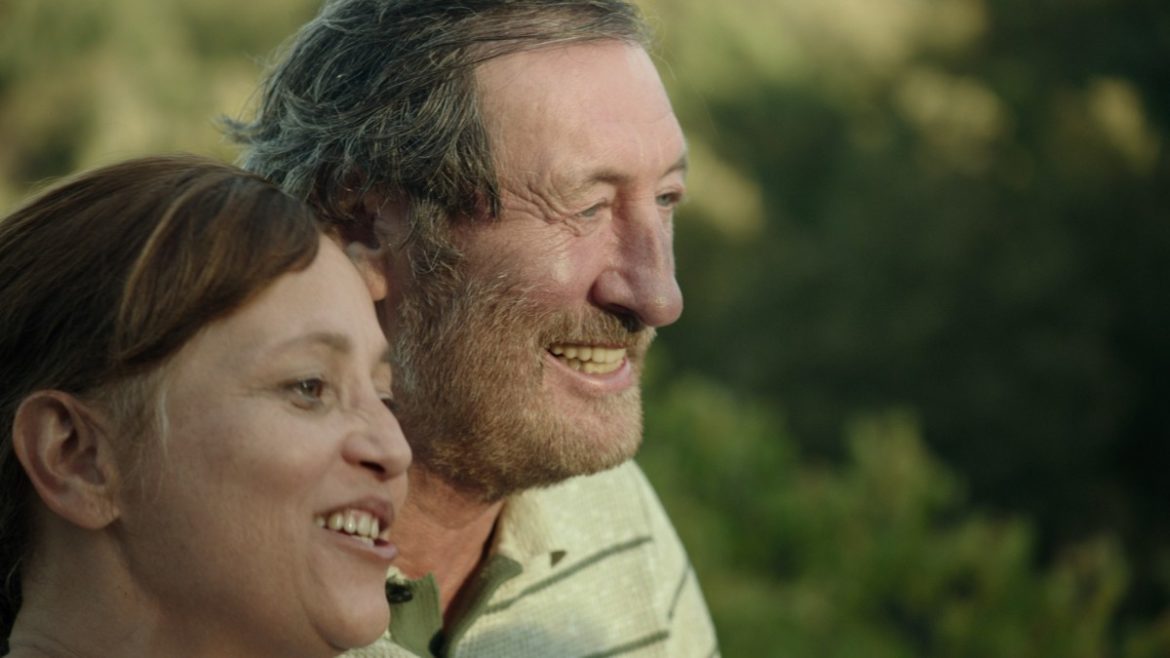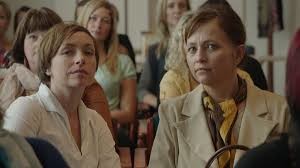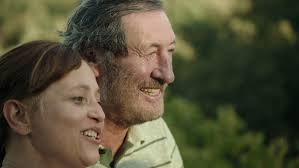Slávek Horák’s Oscar-submitted debut feature Home Care is promising but uneven. A characteristically Czech mixture of comic-tragic tones, it leap-frogs from one mood to another. Some land while others don’t, but it’s a humanist film that never condescends to its characters.
But it showcases two fine, nuanced central performances – from Czech stars Alena Mihulová as our questing protagonist Vlasta, and Bolek Polívka as her husband Láda, by turns stoic, reproachful, and heartbroken, though consistently drunk – and some lovely glimpses of life in the vineyards a few hundred miles outside Prague.
Vlasta is a home care health worker, traveling by bus, car, motorbike, and foot to treat the invalids of her village. Her life has been given over to the health of others, which makes it all the more painful for everyone involved when an accident reveals she has health issues of her own. Given only half a year to live by the matter-of-fact doctors, she pursues a different course. In the past, she’s scorned the New Age wisdom of folk practitioners and cultish women’s self-help groups, but now she finds herself in need of the hope they provide.
So begins a clash between the materialist (and masculinist) logic of modern medicine and a different, more esoteric sort of engagement with the body and the world. At first, Horák seems to tip the scales heavily in favor of the ladies, and we expect a didactic critique — the village comedy by way of Katie Couric and Michael Moore. Instead, we get a much more ambivalent, bordering-on-cynical sort of look at both sides of the debate raging inside Vlasta. But the film’s heart is with the people, come what may.
There are comic touches throughout, resolutely preventing what might otherwise be a total slog. When a doctor asks if Vlasta drinks alcohol, she says, “No, mostly just wine.” Horák himself appears as the older couple’s eventual son-in-law – he offers to drive her to an appointment with a patient (she continues to practice despite increasing illness) and finds himself half-naked in a bathtub so she can clean an obese invalid, then walking out to the car. His fiancee, waiting outside for presumably a long time, quietly asks, “Did you … take a bath?”
These are light moments; others are less so. This is, after all, a film about a terminally ill woman taking care of terminally ill patients (and one guy who uses a wheelchair because he has “a fear of falling”).
Hovering over everything is an anxiety about money and the future. Láda – when not working on quixotic projects in his shed or pouring drinks upon waking – is angry from the start that she spends more cash on these people than she brings in, though it’s never quite clear what he does himself for the household finances. He can’t even stuff a bedsheet properly, for Christ’s sake.
But the relationship between them grows fascinating. It’s clear the film wants to contrast the two, in the same way it somewhat methodically sets up a masculine / feminine divide in the context of medicine. But as in that case, things are deeper and more complicated than they appear. He gives her a birthday gift, and Horák’s hand-held camera makes a quick jump, barely perceptible – this constitutes a big moment for her. Later, one of Vlasta’s new female friends insists he kiss her, because love is what she needs, and he storms out, either embarrassed by such openness or unwilling to be talked down to by the hippies who’ve infiltrated not just his village but his home.
Not all the pieces fit in Home Care – some of the symbolism is heavy-handed, the tonal shifts are abrupt, and there’s an unfortunate tendency for people to declaim rather than act. It’s clear that this is a first time director grappling with big themes on a small scale. But as we travel through the (frankly gorgeous) countryside, often in silence, and take in these lives, it’s difficult not to be at least somewhat charmed and affected.
The film closes on a wedding, as many others have and many more will. The only song in the film occurs, sung by Vlasta to her daughter. It’s an awkward heartbreaker, recounting their often fraught relationship since Vlasta’s own pregnancy with her – the kind of thing you hope nobody does at your wedding, in front of everybody. But it’s also a sincere tribute to all Vlasta knows will be left behind, written in plain verse and set to a folk melody.
As she sings, some guests watch in rapture, while others text on cell phones. It’s a true and poignant set of images, and Horák is a filmmaker worth watching.



